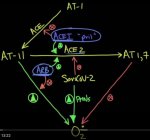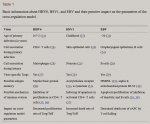Float
Senior Member
- Messages
- 307
- Location
- Australasia
A Unifying Hypothesis of the Pathophysiology of Myalgic Encephalomyelitis/Chronic Fatigue Syndrome (ME/CFS):
Recognitions from the finding of autoantibodies against ß2-adrenergic receptors
Has anybody read this?
I thought we tended more to low blood pressure than high (please correct me?). I understand there are only 'types' of ME/CFS, not one big group.
Recognitions from the finding of autoantibodies against ß2-adrenergic receptors
Has anybody read this?
I thought we tended more to low blood pressure than high (please correct me?). I understand there are only 'types' of ME/CFS, not one big group.
Abstract
Myalgic Encephalomyelitis or Chronic Fatigue Syndrome (CFS/ME) is a complex and severely disabling disease with a prevalence of 0.3% and no approved treatment and therefore a very high medical need. Following an infectious onset patients suffer from severe central and muscle fatigue, chronic pain, cognitive impairment, and immune and autonomic dysfunction. Although the etiology of CFS/ME is not solved yet, there is numerous evidence for an autoantibody mediated dysregulation of the immune and autonomic nervous system.
We found elevated ß2 adrenergic receptor (ß2AdR) and M3 acetylcholine receptor antibodies in a subset of CFS/ME patients. As both ß2AdR and M3 acetylcholine receptor are important vasodilators, we would expect their functional disturbance to result in vasoconstriction and hypoxemia. An impaired circulation and oxygen supply could result in many symptoms of ME/CFS. There are consistent reports of vascular dysfunction in ME/CFS. Muscular and cerebral hypoperfusion has been shown in ME/CFS in various studies and correlated with fatigue. Metabolic changes in ME/CFS are also in line with a concept of hypoxia and ischemia.
Here we try to develop a unifying working concept for the complex pathomechanism of ME/CFS based on the presence of dysfunctional autoantibodies against ß2AdR and M3 acetylcholine receptor and extrapolate it to the pathophysiology of ME/CFS without an autoimmune pathogenesis.


